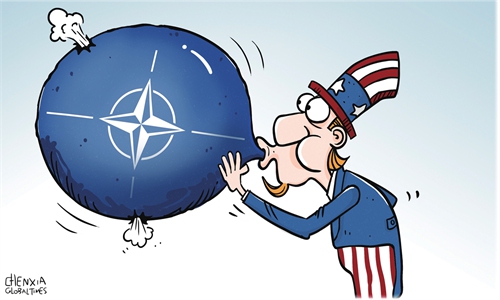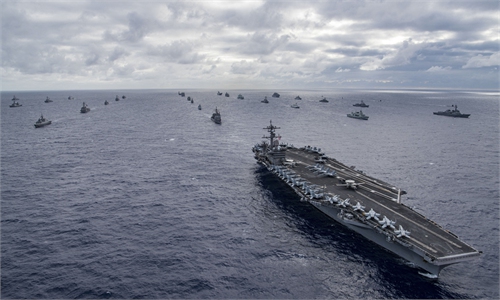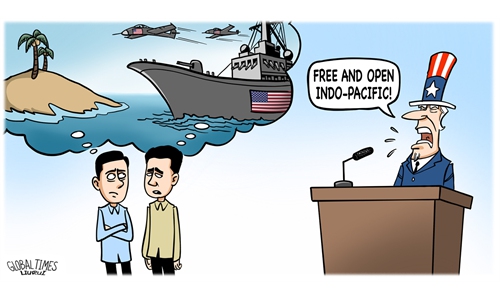
Gen. Mark Milley testifies before the Senate Arms Services Committee on his nomination to be chairman of the Joint Chiefs of Staff on Capitol Hill in Washington DC,the United States, on July 11, 2019.Photo:Xinhua
US high-level officials, ranging from politicians to military chiefs, kick start a new brainwashing tour in the Asia-Pacific region.
During his trip to Indonesia on Sunday, Mark Milley, chairman of the US Joint Chiefs of Staff, said that the Chinese military has become "significantly and noticeably more aggressive," because the number of interceptions by Chinese aircraft and ships in the Pacific region with the US and its allies have increased.
Also on Sunday, Western media outlets hyped that US Deputy Secretary of State Wendy Sherman and US ambassador to Australia Caroline Kennedy planned to visit the Solomon Islands in August, with the aim to push back China's influence.
Milley's visit to Indonesia is the first by a top US general since 2008. The timing seems delicately arranged given the fact that Indonesian President Joko Widodo's China tour started on Monday. Sherman and Kennedy's upcoming visit to the Solomon Islands is filled with utilitarian mentality. For decades, Pacific islands have not received high-level diplomatic attention from Washington, but right after China signed a deal with the Solomon Islands, Americans started visiting the island country one after the other.
Be it Milley or Sherman and Kennedy's visit, they all share a single goal - that of demonizing China and if possible, turning regional countries against China. But regional countries are well aware what rhetoric such as "China becomes more aggressive" means - when the US stretches its hands too far, China's legitimate defense is portrayed as aggression, when the US goes to extremes in provoking China via tactics like close-in reconnaissance, China's justified interception is called a " threat."
When US officials travel across the Asia-Pacific region, telling people how dangerous China is, while acting as an innocent party, Washington is treating regional countries as fools. Widodo's China visit right after Milley's remarks could be a coincidence. But to some extent it shows that Indonesia is not buying the US' rhetoric, or taking the US' side.
While cozying up to ASEAN members, lately the US has also been putting more effort on the Pacific islands. When Western media covers Sherman and Kennedy's Solomon tour, they tend to highlight that the two politicians' fathers fought in World War II in the region, and the US is now in a modern-day battle for influence with strategic rival China.
This comparison is a wrong abuse of history. During the WWII, Sherman and Kennedy's fathers fought against the expansion of the Japanese Empire and the fascist Axis powers' ambitions for world hegemony. Today, US politicians abandoned their fathers' spirit and are doing the exact opposite, pursuing their own hegemony and privileges. In the case of Pacific countries, they are demanding regional countries not to accept China's assistance in local development, even when they have no ability to do it by themselves and when the US can offer zero help, Shen Yi, a professor at Fudan University, told the Global Times.
It is the US that seeks to dominate the Pacific region and even the world. In other words, the US is playing the role which Japan had once played during the WWII.
China is helping the Solomon Islands and other regional countries with their development, including infrastructure construction and China would be willing to see the US participate in it. "If the US takes the islands as its own sphere of influence, it has more reasons to invest there," Song Zhongping, a Chinese military expert and TV commentator, told the Global Times. Unfortunately, the US owes them too much throughout history. The fallout of US nuclear test in the region is still wreaking havoc; The US would overthrow local regimes once they are not obedient; and when it comes to local economic and social development, the US has done nothing, according to Song.
Seeing it has less and less to compete with China, the US is getting desperate, and the most convenient tool it has left is to hype the "China threat."
The US wishes to see as much tension as possible in the Asia-Pacific region, but it has one principle when stirring up trouble - the villain must be China, not the US. That's why the Pentagon suggested that US House Speaker Nancy Pelosi's Taiwan visit is "not a good idea" - if Pelosi made the visit, the villain would be the US. That does not conform to the US playbook. What other option does the US have when China is not aggressive? Demonizing China, advertising the idea across the region, attempting to turn China's neighbors against it.
But not all countries are fools. People can see that when China brings practical cooperation, all the US talks about is containing China. When China exports infrastructure commodities, the US exports weapons and wars. For quite some time, Western domination has meant poverty and stifled foreign policy for other countries.
The facts clearly show who is being aggressive and dangerous. The more the US attacks China, the more weakness and lack of confidence the world smells from the US.



